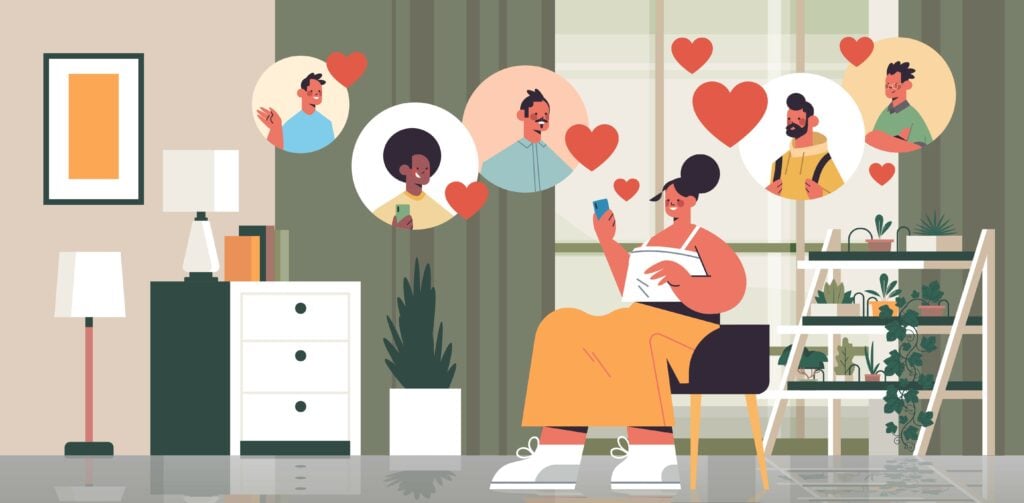Why people ghost (and how to get over it)
Reviewed by Stephanie Steinman, PhD, CSAC


The idea of “ghosting” has entered the mainstream courtesy of dating apps and social media. When someone stops responding to your messages or taking your calls suddenly and without explanation, you’ve been ghosted. And even though it happens all the time, it can feel like the end of the world.


What ghosting looks like
People usually talk about being ghosted by someone they’re dating, but this passive-aggressive behavior isn’t limited to the world of romance. It can also happen in friendships, professional relationships, and families. Here are examples of what ghosting can look like:
- You planned to go to lunch with a friend you haven’t seen in years, but after spending a few days texting back and forth about a date and time, they stop responding.
- Your sister got married several years ago and moved away, but when you try to reach out to plan a visit, she never replies.
- After a job interview, the hiring manager says you’ll hear back the following week about whether an offer is coming—and then they never contact you again.
- You’ve been messaging for a few weeks with someone you met on Instagram, and you both agree to meet at a coffee shop. But they don’t show up and won’t respond to your messages when you ask where they are.
Ghosting vs. breadcrumbing
Sometimes a person doesn’t fully ghost you, but they come close: acting like they’re interested, but never following through with concrete plans. This is called “breadcrumbing,” and it often involves very occasional or seemingly random messages. The person’s low level of commitment can give you false hope that something more serious might come from the connection.
Why do people ghost?
It’s never easy to be the one who’s ghosted. You might assume the other person doesn’t care about you at all, but that’s not always the case.
On the other side of a ghosting, there’s another human being who may feel they have no choice but to cut off communication. Someone may ghost because they’re afraid to express themselves directly, or because they want to avoid an awkward or difficult conversation. They may be more likely to behave this way if they’re influenced by:
- Personality traits such as introversion, shyness, or perfectionism
- Anxiety over difficult situations and conversations
- Fear of rejection and judgment
- Fear of hurting your feelings
- Stress or overwhelmed feelings
- Insecurity and low self-esteem
- Lack of self-awareness, emotional intelligence, or communication skills
- Their own history of trauma and worries about being abandoned
There’s complexity behind why people ghost. It’s unlikely someone decided to ignore you out of spite. They might even have disappeared as a way to protect themselves (and possibly you, too).
Most of the time, ghosting is a coping mechanism for avoiding uncomfortable interactions, but it can also stem from a deeper problem. One study found that people who’d previously ghosted former partners and saw it as acceptable behavior were more likely to have narcissistic, Machiavellian, and psychopathic traits—which suggests that ghosting may sometimes arise from a serious mental health concern that has nothing to do with you.1
How ghosting can affect you
Even if you know it’s not you, it’s them, being ghosted can still be incredibly painful. It tends to happen when you least expect it, leaving you feeling rejected, confused, and frustrated. You may experience:
- Shock
- Disbelief
- Frustration
- Anger
- Sadness
- Resentment
- Guilt
- Shame
- Anxiety
- Depression
It’s normal to feel all those negative emotions. Research shows that people who’ve experienced breadcrumbing or ghosting are more likely to express lower life satisfaction and a greater sense of loneliness and helplessness.2 Being ignored or excluded by others tends to activate an area in the brain that’s associated with feeling pain.3
Ghosters may not be aware of this, but by cutting off communication they’re essentially leaving you in an emotional void. Never getting a real explanation for someone’s disappearance can make it harder to cope; you may question over and over again what went wrong and try to figure out how you could have prevented it. This can be especially difficult if you’re a sensitive person and feel like you need closure to move on.
How to deal with being ghosted
Nobody ever plans to get ghosted, so by nature it’s bound to catch you off guard. If it happens, here are some tips for how to cope:
Stop chasing. Reaching out again and again for answers will only prolong a painful situation and make you feel worse. One way to break the cycle is by making it harder to contact your ghoster: You can delete their number from your phone and unfollow or block them on social media.
Let yourself grieve. You’ve suffered the loss of a relationship and the hopes you may have had for its future. Don’t bottle up that sense of loss—allow yourself time and space to process your grief.
Remind yourself it’s not your fault. Ghosting often has more to do with the ghoster’s problems than with something you did or said.
Write down your thoughts. Journaling can be a therapeutic way to make sense of what happened. Try to focus on naming your feelings, exploring why you feel the way you do, and deciding what you can do to move forward.
Talk to someone you trust. A friend or family member who’s a good listener can help you get some of those negative feelings off your chest and remind you that you’re not alone.
Pump up your self-care routine. Now is the time to take extra special care of yourself. Get good rest, eat well, stay active, spend time with loved ones, and do your favorite things (listen to music, make some tea, watch a comforting movie). Prioritizing your physical and emotional health will help you feel better and remind you of your worth.
Focus on what you can control. Don’t waste too much time trying to figure out why a ghoster did what they did. At the end of the day, it’s not something you have the power to change. Try focusing on the aspects of your life you do have control over, and be proactive about making positive shifts.
Remember that healing takes time. It may take a while for you to feel better, so try to be patient and compassionate with yourself. It may help to keep in mind that your distress will ease, and you won’t feel bad forever.
Get extra support. Talking with a mental health professional can be a big help, especially if your negative emotions feel so overwhelming that they’re affecting your everyday life. A therapist or counselor can help you gain insight into your experience and develop healthy coping mechanisms. Visit our directory to find a licensed professional near you.
Nobody deserves to be left in the dark, but ghosting happens every day. If you’re trying to get over a ghoster, remember that you’re in good company—and the memory of this painful moment will fade away eventually, just like a . . . well, you know.

Sources
About the author
Elise Burley is a member of the therapist.com editorial team. She has more than a decade of professional experience writing and editing on a variety of health topics, including for several health-related e-commerce businesses, media publications, and licensed professionals. When she’s not working, she’s usually practicing yoga or off the grid somewhere on her latest canoe camping adventure.
Related articles

Sex, intimacy, and mental health
Safe, consensual sex between adults is a normal, healthy part of life. Learn...

The psychological effects of dating apps
Dating apps can help you find your person, but they can also be hard on your...

It feels good when a new partner showers you with attention, but it may be a...

